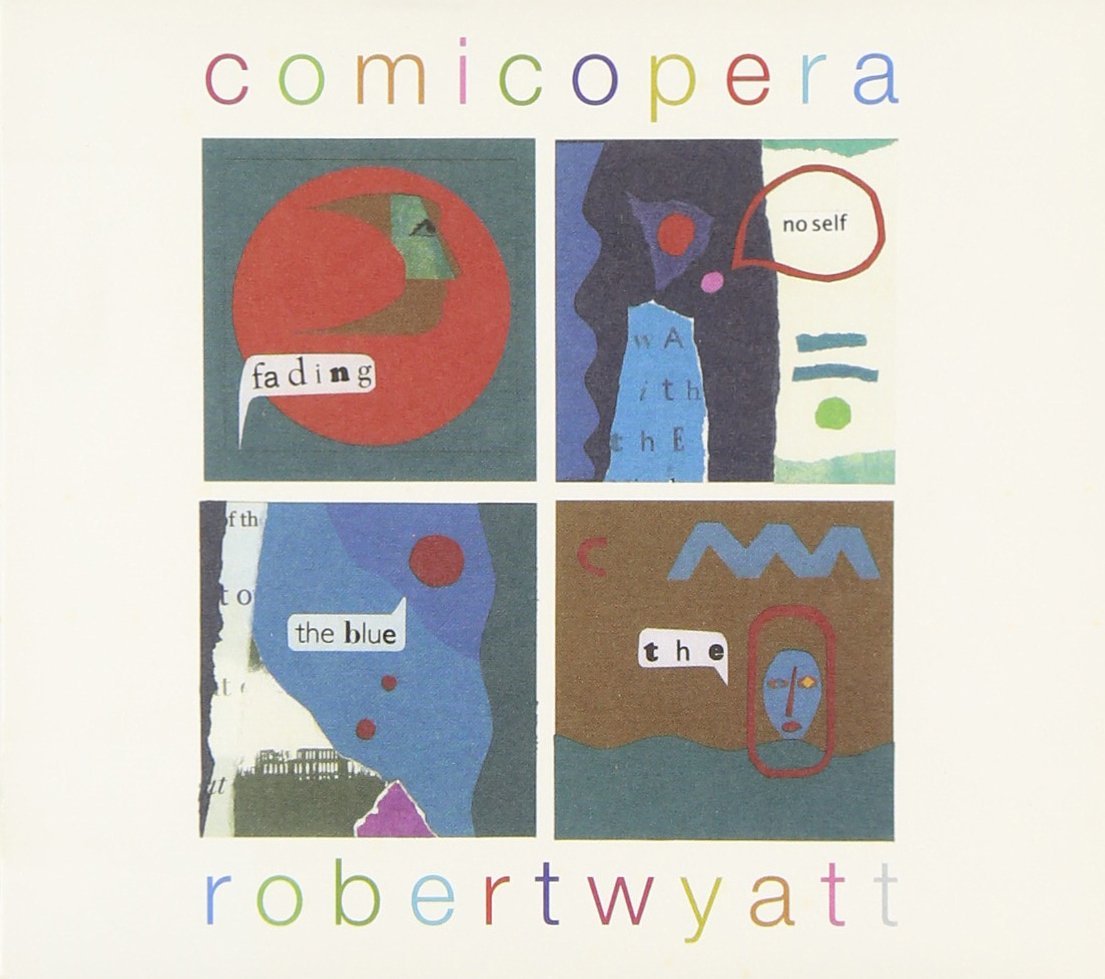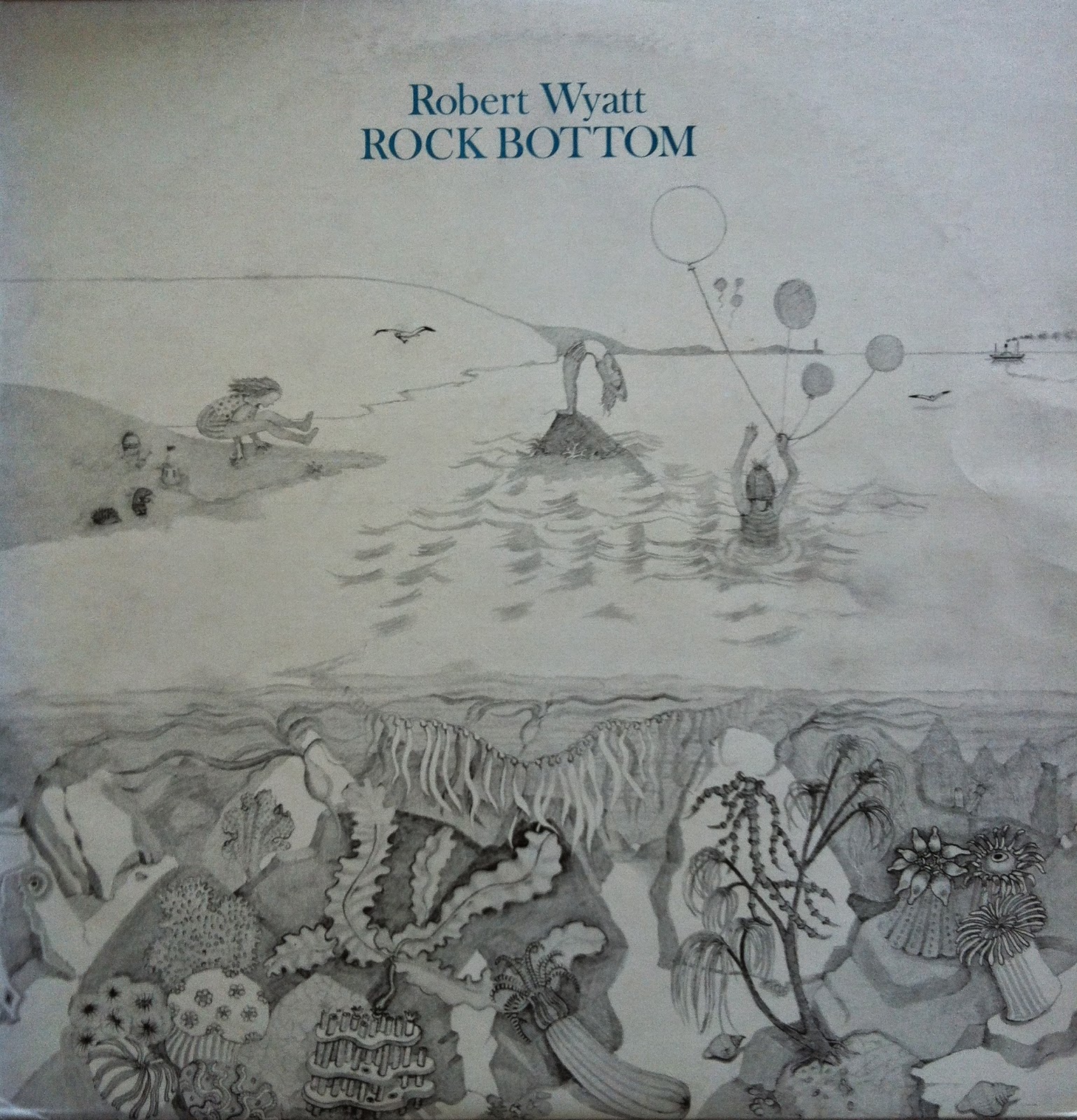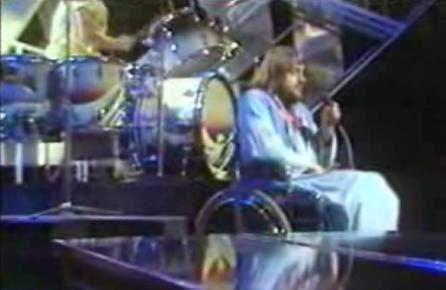Robert Wyatt, now in his 70s, is surely one of the most intriguing, distinctive and sometimes infuriating musicians born out of 1960s Britain. His musical output has been intermittent, not surprising for someone suffering depression throughout his life, as well as the consequences of an accident in 1973 that left him permanently paralyzed from the waist down. Yet his recorded output contains many wonders. The surrealist psychedelia of the early Soft Machine and Matching Mole, the intensely personal bittersweet Rock Bottom, the series of Rough Trade singles which include his forlorn interpretation of Chic’s “At Last I am Free”, his version of Elvis Costello and Clive Langer’s anti-war “Shipbuilding” about the Falklands War, as well as an eclectic series of collaborations with musicians such as Bjork, the Raincoats, Carla Bley and Brian Eno.
When I began reading Marcus O’Dair’s biography of Robert, I was nervous. In particular how would it handle the politics? I mean Robert Wyatt joined the Communist Party in the years of its final decline. Yet this is a riveting biography that captures much of the life of a deeply idiosyncratic musician. Here is a story that doesn’t begin in Detroit, or Liverpool – but in leafy Dulwich and in provincial Kent. But it is one that blossoms in the centre of counter cultural London. Along with Pink Floyd, Robert’s group Soft Machine was the house band of the London underground scene. When the Softs played the launch of International Times (IT) magazine at an all night gig in 1966, Yoko Ono did performance art on stage while they were playing.
Necessarily at the center of the book is his drunken fall in 1973 from a fourth floor window whilst at a party. This summarily ended his career as a drummer and has left him in a wheelchair ever since. He apparently only survived because he was so intoxicated that his body was relaxed. This sorry tale intertwines with his romance and subsequent marriage to Alfreda Benge (Alfie), clearly the love of his life, the distinctive illustrator of his subsequent albums and later his manager. And out of this came the Rock Bottom album – surely his greatest work. The book casts fascinating light on the genesis of this deeply poignant record – a piece of music that still has the same emotional impact on me that it did when I first heard it in 1975. It was begun in Venice before the accident whilst Alfie worked as an editor on Nick Roeg’s movie Don’t Look Now. But it reached its final shape during Robert’s long sojourn in hospital after his fall.
Robert’s confinement to a wheelchair has made it almost impossible for him to perform live. It forced him to reinvent himself as singer, multi-instrumentalist and composer. However he did appear on Top of the Pops in September 1974 miming his erstwhile “hit” (it reached number 29 in the charts) “I’m a Believer”, a Neil Diamond song previously recorded by the Monkees in the 60s. The BBC producer of the show behaved shamefully, insisting that a man in a wheelchair was not at all suitable for “family viewing”. It took a whole day’s arguing before the Beeb backed down. This of course was the period when a certain Jimmy Saville frequented Top of the Pops.
What I hadn’t realized until reading the biography was that Robert has suffered chronic depression for much of his life. O’Dair’s handling of this is first class. His description of Robert’s suffering in the nineties was particularly moving. Anyone who suffers depression cannot fail to empathize with this enormously. His fragile mental health has also meshed with a growing dependence on booze. Astonishingly for a 60s musician Robert was never into dope or acid but he has drunk heavily ever since his Soft Machine days. By the time of his last solo album comicopera this had become so bad that Alfie was threatening to finally walk out on him unless he went on the wagon (which thankfully he did). “Just As You Are” on comicopera was co-written with Alfie about exactly this.
Yet the most difficult bit to read of the biography is not about the accident or his alcoholism, but about his political trajectory. From the mid 1970s along with Alfie, Robert moved into the orbit of the Communist Party where he championed a “tanky” line against the Eurocommunists. Sometimes it did lead to good, yet cringe worthy recordings like “Stalin Wasn’t Stallin”. He also worked closely with exiled South African jazz musicians in the UK such as Mongezi Feza. But there is no point of thinking “if only he’d met Tony Cliff” (the founder of the International Socialist tradition). The biography makes clear Robert was never a revolutionary. He was and is a socialist but his politics contain a great deal of sentimental nostalgia for the past – particularly of the Popular Front era of the late 1930s and the wartime alliance with the Soviet Union as well as post war Labourism.
Here however is the biggest weakness of the biography and I really do wish the author had a bit more political accumen. So in the 70s Robert Wyatt is deeply horrified by the growth of the Nazi National Front but there is no discussion of the rise of the Anti Nazi League or Rock Against Racism. Surely Robert had thoughts about them, one way or another. Why didn’t the biographer probe him here? It seems such a waste especially as Robert later did become involved with musicians who played RAR gigs such as Jerry Dammers. In fact the biographer seems to think the left in the 1970s and 80s consisted solely of the Communist Party with its warring factions of Eurocommunists and pro-Moscow Tankies, which I just found weird.
Robert and Alfie eventually did leave the Communist Party, demoralized after the collapse of the Stalinist states. Yet he still remains a fierce anti-racist and socialist. When he was asked to curate Southbank Centre’s annual Meltdown festival in 2001, one of his early suggestions was to turn the festival into a tirade against the then Tory shadow Home Secretary by assembling “every single economic migrant and bogus asylum seeker who could sing or play a musical instrument and let them completely take over the South Bank”. He planned to call it the Anne Widdecombe special.
Following the release of comicopera Robert announced his retirement. However since then alongside individual collaborations, he has made a terrific jazz album For the Ghosts Within with the incredibly dodgy but superb saxophonist Gilad Atzmon, and Ros Stephen. Having disposed of all my Atzmon discs when I realized how appalling his politics were, I still couldn’t dump this album. For Robert’s version of that dreadful Louis Armstrong song “What a Wonderful World” transforms a sentimental disaster into an inspiring socialist anthem.
Listening list
- “God Song” from Matching Mole’s Little Red Record (1972)
- “Sea Song” from Rock Bottom (1975)
- “At Last I Am Free” from Rough Trade compilation Nothing Can Stop Us (1982)
- “Shipbuilding” (1983)
- “Free Will and Testament” from Shleep (1997)
- “Just As You Are” from comicopera (2007)
* * *
Marcus O'Dair, Different Every Time: The Authorised Biography of Robert Wyatt. London: Profile Books, 2014.
An earlier version of this piece appeared at revolutionary socialism in the 21st century.
Neil Rogall is a revolutionary socialist and Palestine solidarity campaigner in the UK.




